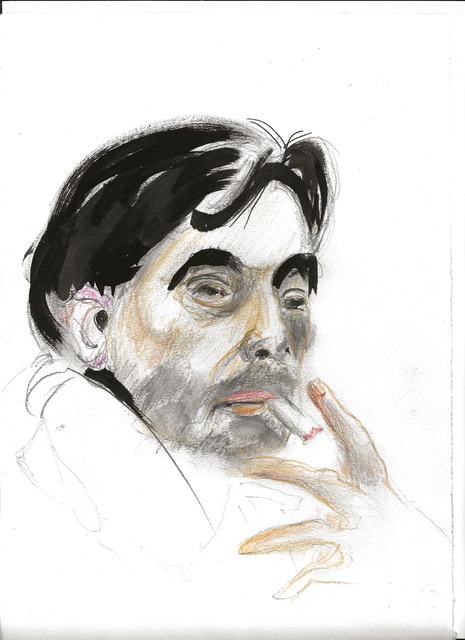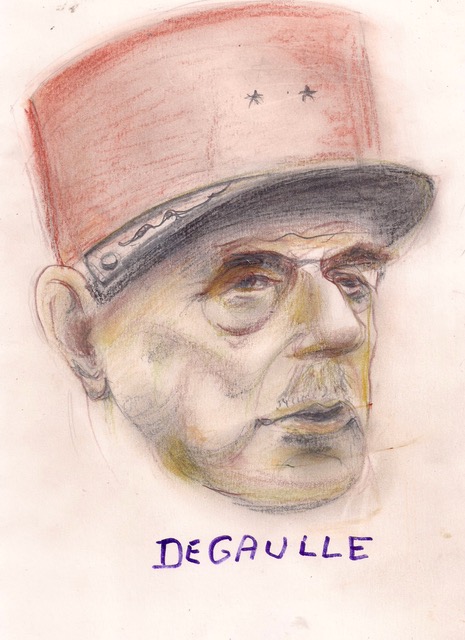The portrait artist at work: The mind behind the face
No human faces are identical. The human genome has produced some 7.7 billion varieties, all different. Several branches of science are jostling for breakthroughs in understanding how this has happened and how the brain copes with this near-infinite number. The Chinese lead the way. From their vast computer-based network of surveillance cameras across the country, they are known to log some 7 million faces in one typical day to keep track of the country’s huge facial data base, just in case.
As a portrait artist, I am an amateur at this compared to the technology gurus and psychologists who study facial recognition seriously. Their aplications range from law enforcement to immigration control to ethnic groupings to the search through a crowd to find someone we know.
“I never forget a face,” says a friend who helped me research this article, and he speaks the truth. I don’t either. But we are not all so talented. Science has coined a new word to describe the opposite condition. Those rare individuals who are unable to remember faces suffer from a condition termed “prosopagnosia”.
In my amateur artistic way, I prefer to count on intuition to find facial clues to a subject’s personality before sitting down at the drawing board. I never use the latest software to grapple with this dizzying variety.
If a subject resembles a bull, I might think of him or her as hardworking but mentally deficient. And I cannot escape noticing that the lady walking her dog in the park bears a strange resemblance to the dog. Do they have similar behavior? I wonder.
Almost no two individuals agree on the meaning, if any, the placement of noses, jaws, eyes set too closely together, low brow, joined eyebrows. But I try.
Living in Europe, what interests me most is guessing the national origin of the stranger. To what extent are attitudes and behaviors predictable in the national look ? Surprisingly often, I would argue. Common physical traits are visible in the Frenchman, the Italian type, the Russian, the Spaniard, the honey-blonde Finn. Their national cultures come with the face. (The French immediately categorize me as an Anglo-Saxon. It’s my long face – sometimes called a horse face -- that gives me away.)
Of course the French were never one culture, one race. And now, more than ever, foreign ethnic influences have swarmed across borders to breed hybrid offspring. Any mosaic of French faces depends heavily on foreign influences. The Franks, Saxons, the Scandinavians and the southern border cultures make up a fascinating mix, a challenge and a stimulant for the portrait artist.
Yet I submit that the French face often does hold commonalities that separate it from other Latin types. A teen-aged British girl, daughter of a friend of mine, noticed the French type immediately upon stepping off the plane in Paris. Making her first trip to France, she looked around and said to her dad, “Wow -- these people are different!” She was right.
Technology aside, it’s a short step for artists to attribute behavior patterns to most of these types. The desire to look inside other minds refuses to quit.
In my forthcoming book, “25 Unforgettable French Faces”, I have privately labeled them as the pointy-nosed, the esthete, the nonchalant, the undersized, and the walking caricature. They are similar but all quite different. I have drawn conclusions from each facial type.
Examples : Hollywood for years called on Charles Boyer to typify one French look – bedroom eyes, sly maneuverings, the haughty look. Jacques Cousteau was a magnet for female friends. Yves Montand’s face fairly shouted “Beware -- I am a seducer.”
Brigitte Bardot as a young actress had a “come hither” message that no man missed. (In her old age, she has lost some of her appeal, like all of us.)

The late singer and song writer Serge Gainsbourg made a trademark of his designer stubble and his dangling Gitanes cigarette.

A face of another type, the massive mug and narrow eyes of Charles de Gaulle, revealed his belief in an inborn superiority. His height (6 feet 5 inches, 196 centimeters) helped feed his ego. The fine traits of Valery Giscard d’Estaing indicate an intellectual approach to life. It follows, then, that his chit-chat was laced with references to Voltaire and Corneille. I once interviewed him for an American magazine and after a few high-minded pleasantries we spoke English. I discovered that his English was almost as almost good as mine. I felt an inch tall.

A large proportion of us might get a shock from a photo that catches us unaware. “Is that really me?” my friend asks. And another friend , a writer at work on a biography of actor Jean Gabin, reports that Gabin was horrified by his first screen test. He had not realized he had such a large nose. He thought that was the end of a film career. Facial clues can be misleading. He was very wrong.
Portraits drawn by the author Michael Johnson.
END
This article is brought to you by the author who owns the copyright to the text.
Should you want to support the author’s creative work you can use the PayPal “Donate” button below.
Your donation is a transaction between you and the author. The proceeds go directly to the author’s PayPal account in full less PayPal’s commission.
Facts & Arts neither receives information about you, nor of your donation, nor does Facts & Arts receive a commission.
Facts & Arts does not pay the author, nor takes paid by the author, for the posting of the author's material on Facts & Arts. Facts & Arts finances its operations by selling advertising space.


















